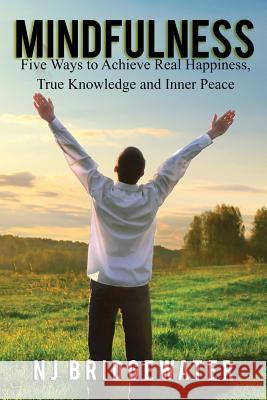Mindfulness: Five Ways to Achieve Real Happiness, True Knowledge and Inner Peace » książka
Mindfulness: Five Ways to Achieve Real Happiness, True Knowledge and Inner Peace
ISBN-13: 9780995736917 / Angielski / Miękka / 2017 / 278 str.
Dear reader, How can we be truly happy? How can we achieve inner peace and mindfulness? How can we maintain true balance in our lives? What is our true purpose in this world? These questions and more are answered in Mindfulness: Five Ways to Achieve Real Happiness, True Knowledge and Inner Peace. I have searched out the key books on wisdom and philosophy which hold answers to these questions and has extracted the core teachings and principles which they contain. I have encapsulated these into Five 'Ways to Be', which are patterns or ways of living in harmony with one's higher self. There are also 'Five Practices' which accompany these Ways to Be, giving a practical method of developing the right attitudes, behaviour and mindset to achieve a state of mindfulness and happiness. In addition, for each practice, he lists a number of steps for further development. These will allow the reader to take action immediately to put all the Ways to Be into practice. Mindfulness means, simply defined, to be conscious or aware of something. In the context of this book, however, it also means achieving a mental state of awareness which allows you to embrace your higher nature while remaining conscious of the impermanence of all material things. This will allow you to achieve a state of balance which is called 'equanimity'. The Five Ways to Be, therefore, can be described as the 'philosophy of equanimity'. This book will help you to achieve a state of mindfulness and equanimity, so that you can live at one with yourself and your spirit, and feel true happiness and joy. Happiness is not just material pleasure. True happiness comes from within. What will you learn in this book? -How to be detached. -How to be more generous. -How to meditate. -How to be at peace with yourself and others. -How to find your life's purpose. -How to achieve a state of balance in your life. The book also contains a number of quotations from the great philosophers and teachers of the ages, including Plato, Buddha, Aristotle, Cicero, Francis Bacon, Marcus Aurelius, Confucius, Laozi and others. These have been carefully selected to help the reader focus on the core principles which are being taught. They can also be used as 'meditations' which the reader can draw on for inspiration, contemplation and personal development. At the end of the book, there is also a link to Equanimity Blog, where you can find related, free posts which expand on the topics and principles of the book. There is also a link to a bonus chapter with more inspirational quotations which can be downloaded and read for further inspiration. I hope that this book provides value to your life and helps you to achieve true happiness and inner peace. NJ Bridgewater











